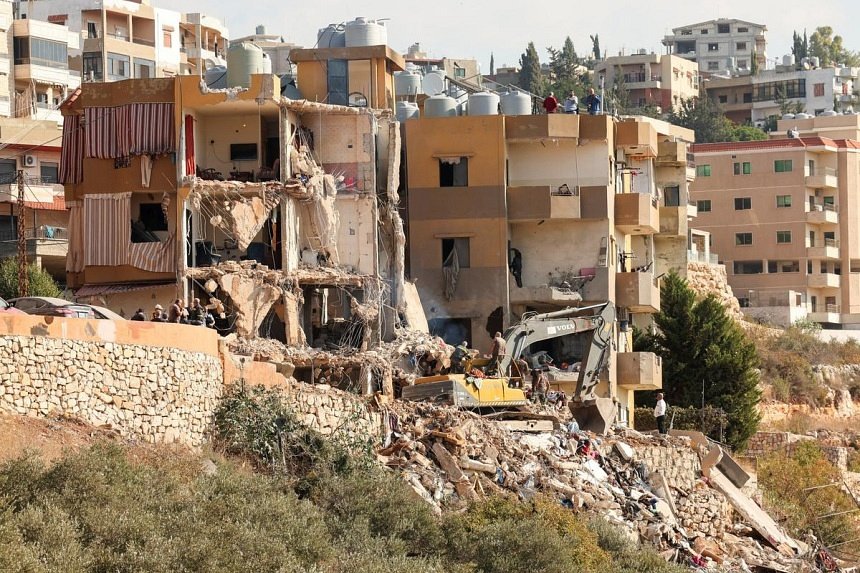BEIRUT – Israeli strikes on Lebanon killed 40 people around the eastern city of Baalbek in the Bekaa Valley on Nov 6, according to the country’s health ministry, and at dusk more strikes hit Beirut’s southern suburbs.
Israel and Iran-backed Hezbollah have exchanged fire for over a year in parallel with the Gaza war but fighting has escalated since late September, with Israeli troops intensifying bombing on swathes of Lebanon’s south and east and making ground incursions into border villages.
Israeli strikes on Baalbek and the Bekaa Valley killed 40 people and wounded 53, the health ministry said. The Israeli military did not comment.
Israeli strikes have also battered Hezbollah strongholds in the southern suburbs of the capital Beirut. At least four strikes targeted the area on Nov 6 after the Israeli military ordered residents to evacuate from several locations.
There was no immediate report on casualties or details on what was hit. The attack happened shortly after Hezbollah secretary-general Naim Qassem said he did not believe that political action would bring an end to hostilities.
He said there could be a road to indirect negotiations if Israel stopped its attacks.
“When the enemy decides to stop the aggression, there is a path for negotiations that we have clearly defined – indirect negotiations through the Lebanese state and speaker (of parliament Nabih) Berri,” Qassem said.
US diplomatic efforts to halt fighting between Israel and Hezbollah, which included a 60-day ceasefire proposal, faltered last week ahead of the US election on Nov 5 in which former President Donald Trump recaptured the White House.
Rescuers dig for survivors
More than 3,000 people have been killed in Israeli strikes on Lebanon over 2023, the vast majority in the past six weeks.
Lebanese rescuers scoured a destroyed apartment building in the town of Barja, south of Beirut, for bodies or any survivors after an Israeli strike on the evening of Nov 5 killed 20 people there, Lebanon’s health ministry said.
Mr Moussa Zahran, who lived on one of the upper floors of the building, returned to sift through the ruins of his home. His burned feet were wrapped in gauze and his son and wife were in hospital after being wounded in the strike.
“These rocks that you see here weigh 100kg, they fell on a kid weighing 13kg,” he said, referring to his son and the apartment wall that had collapsed on him during the strike.
It was not clear whether the strike targeted a member of Hezbollah. There was no evacuation warning ahead of the air raid.
Hezbollah said on Nov 6 that it had fired missiles at an Israeli military base near Ben Gurion Airport. Israeli media reported a rocket had landed near the airport.
Later, the Israeli military said dozens of projectiles had crossed into Israel from Lebanon, some of which were intercepted.
Efforts to bring a diplomatic end to the conflict have stalled. Israeli Prime Minister Benjamin Netanyahu on Nov 5 appointed Mr Israel Katz as defence minister, who vowed to defeat Hezbollah so people displaced from northern Israel could return home.
Mr Berri – a Hezbollah ally and diplomatic interlocutor – met the US and Saudi ambassadors to Lebanon on Nov 6 to discuss political developments, his office said, without providing further details.
Lebanon’s caretaker prime minister, meanwhile, congratulated the US president-elect, without naming Donald Trump.
Mr Netanyahu hailed Trump’s election, while senior Hamas official Sami Abu Zuhri said Trump would be tested on his statements that he can stop the Gaza war in hours as president. REUTERS
